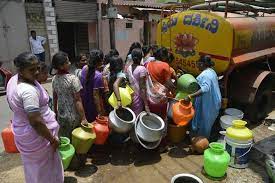NEW DELHI, Mar 17: The water crisis in Bengaluru presents a pressing challenge exacerbated by rapid urbanisation and population growth, and the city described as ‘Silicon Valley of India,’ will need to take interim as well as long term measures including mandatory water harvesting and groundwater recharging to overcome the crisis, says the industry.
The tech heartland of India and home to IT giants like Infosys, Wipro, as well as well-known start-ups, has been hit by a crippling water outage that has left taps dry across parts of the city just weeks ahead of general elections.
The water crisis in Bengaluru presents a daunting challenge exacerbated by rapid urbanisation and population growth, and it is impacting households as also the IT and tech hubs’ operations, say city residents who are facing stringent water restrictions.
Local residents and industry blame the severe water shortage on rapid urbanisation without proper planning, unequal and improper distribution, poor water management and negligence by local authorities.
“The issue is real. Whereas societies got full-day water flow earlier, now water is available only for half of the day. Almost half of the city is grappling with water shortage,” a local resident said.
Videos, on social media platforms, show residents struggling to get water for their basic necessities. Water rationing, housing society advisories to use water sparingly, and people skipping work to make it to long queues for stocking up on essential water supply, underline the grim reality for this bustling tech hub.
Founder and CEO of Matrimony.Com, Murugavel Janakiraman, suggested mandatory water harvesting to solve the crisis.
The issue can be solved by taking steps towards reducing water consumption, recycling, rejuvenating and creating water bodies to increase groundwater levels, and the government facilitating water supply,” he said.
“Companies have started giving work from home, as employees refuse to come to office citing water shortage. This is of course impacting operations because there is a whole new setup that needs to be done to cater to the sudden shift,” co-founder and CEO of Kuku FM, Lal Chand Bisu said.
People are going to nearby malls to fulfil basic daily needs, said another resident, underlining the severness of the water crisis. “Prices of water tankers have more than doubled, from around Rs 2500 for a tanker earlier, to now about Rs 5,000 for the same,” Bisu lamented.
Water harvesting, proper allocation of water coming from outside the city, and government intervention, he said, is the need of the hour.
The government is already implementing numerous initiatives. The city’s groundwater supplies will be restored by injecting 1,300 million litres of purified water into the drying lakes per day.
After testing, the Bangalore Water Supply and Sewerage Board (BWSSB) would also build water plants with cutting-edge technology and put filter borewells next to the restored lake beds in order to deliver water, according to civic agency officials. (PTI)
Trending Now
E-Paper


